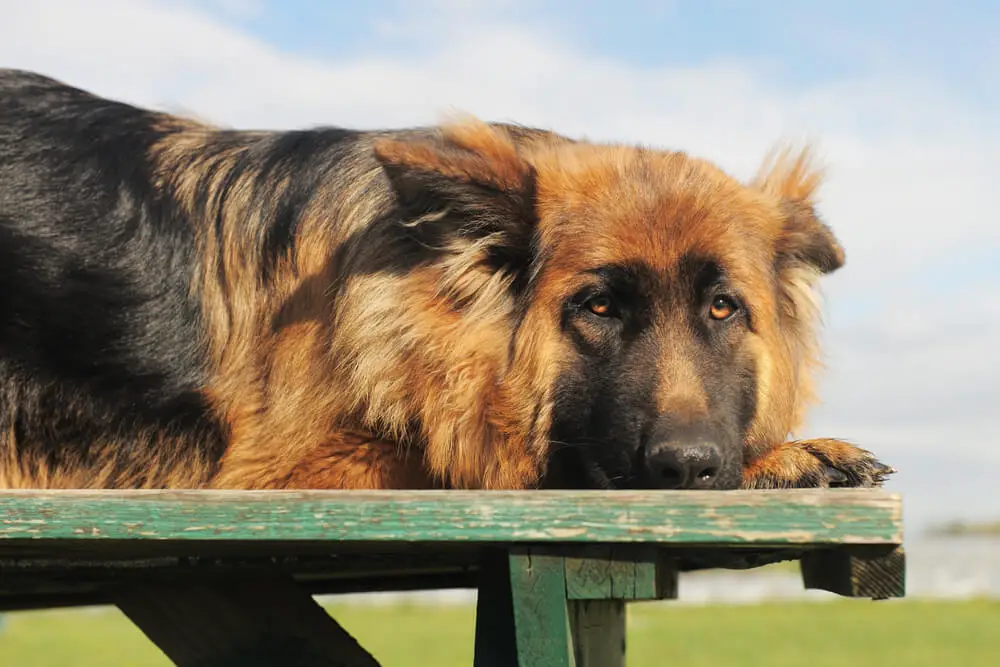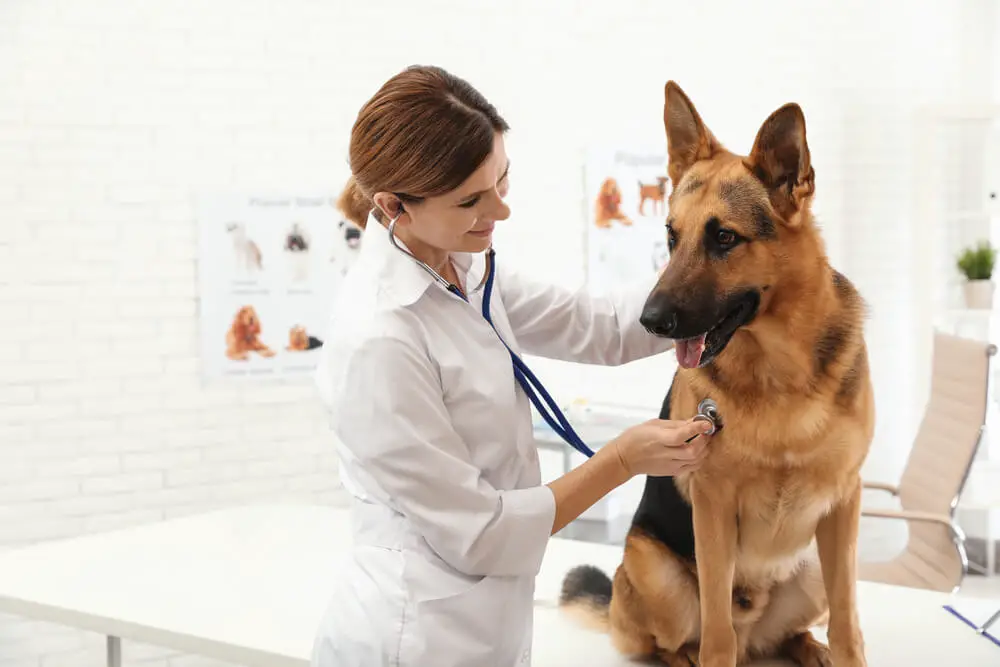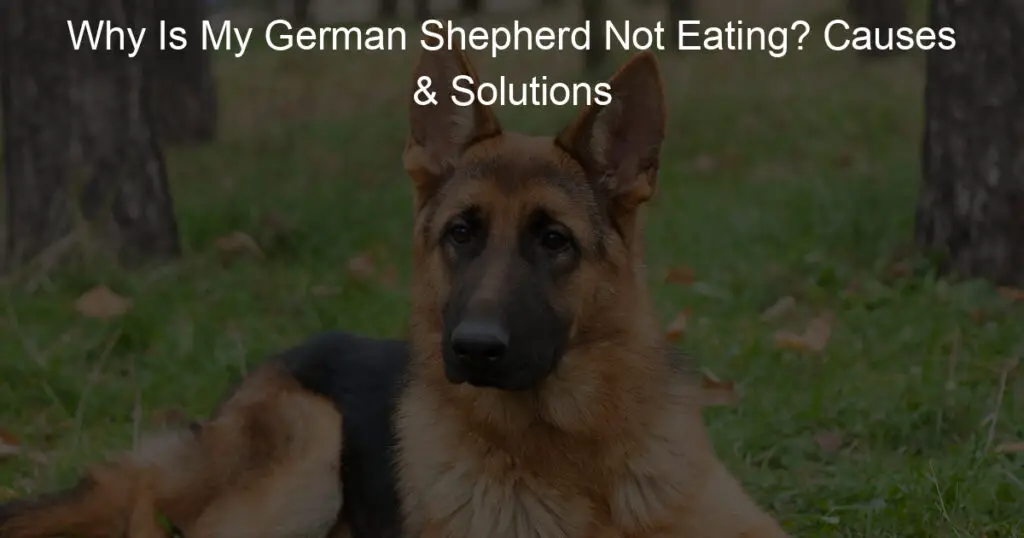It’s not uncommon for pet owners to worry when their furry companions, such as German Shepherds, lose their appetite. Noticing a lack of interest in food can be concerning and raises the question, why is my German Sheperd not eating?
As a responsible dog owner, understanding your German Shepherd’s appetite and knowing the possible reasons behind this change is important.
Various factors can contribute to your German Shepherd not eating, ranging from simple pickiness to more serious health issues.
Being able to identify these reasons will help you determine whether or not it’s a cause for concern and what steps you may need to take to ensure your dog’s well-being.
Remember, it’s not always about forcing them to eat; sometimes, changes in their environment, habits, or health might be the most effective solution.
Key Takeaways
- Develop a clear understanding of your German Shepherd’s appetite and its fluctuations.
- Recognize the common reasons for loss of appetite and differentiate between minor and serious issues.
- Know the appropriate steps to take if your German Shepherd is not eating and how to prevent future eating problems.
Why Is My German Shepherd Not Eating?

The Eating Habits of German Shepherds
German Shepherds are known for being strong, active, and intelligent dogs. However, sometimes, they might be affected by changes in their appetite. This could be due to various reasons, such as boredom, illness, or stress.
It’s essential to monitor your German Shepherd’s eating habits and determine if there is a particular reason for their decreased appetite.
This could help you identify potential health issues or find ways to make their meals more enjoyable.
It’s important to understand that there might be situations where your German Shepherd isn’t eating because they’ve grown tired of their food.
Some dogs require variety in their diet, and feeding them the same kibble every day might not be as appetizing for them.
The Importance of a Balanced Diet
A well-balanced diet is crucial for your German Shepherd’s overall health and well-being. It not only provides the necessary nutrients but also prevents health problems that might result from nutritional deficiencies.
Keep in mind that German Shepherds are prone to specific health issues, such as hip dysplasia or bloat. Ensuring they have the right nutrients could help prevent these conditions or manage them more effectively if they’re already present.
You should consult with your veterinarian to determine the best diet plan for your German Shepherd, as they’ll be able to provide expert advice based on your dog’s age, weight, and activity level.
Also, you can observe your dog’s condition – if they have a shiny coat, healthy skin, and strong muscles, their diet is likely well-balanced.
Remember that it’s crucial to determine the root cause of your German Shepherd’s lack of appetite. In some cases, it might be due to medication or an underlying health issue.
Don’t hesitate to consult your veterinarian if you notice any changes in your dog’s behavior or eating habits, as they can provide the necessary guidance and treatment options.
Common Reasons for Loss of Appetite

Health Conditions
One possible reason your German Shepherd may not be eating is due to underlying health conditions. Illness can cause a loss of appetite in dogs, just like it does in humans.
Some common health issues that may affect your German Shepherd’s appetite include dental problems, infections, or digestive issues.
Keep an eye out for any other symptoms your dog might be experiencing, and consult your veterinarian for proper diagnosis and treatment.
Changes in Environment
If your German Shepherd has been exposed to a recent change in its environment, it may be feeling stressed or anxious, leading to a loss of appetite.
Factors such as moving to a new home, the addition of a new family member, or even a change in weather can cause stress in dogs.
To help your dog feel more at ease, try to maintain a consistent routine and provide them with familiar items, like their bed or toys.
Picky Eater Syndrome
Some German Shepherds may simply be picky eaters and not like their current food. If you’ve recently changed their diet, there’s a chance your dog simply doesn’t enjoy the taste.
In this case, you could try switching back to their previous food or experimenting with different flavors and textures to find one they prefer.
However, it is important not to indulge your dog’s pickiness too much, as it can lead to an unbalanced diet.
Age-Related Changes
As your German Shepherd ages, its appetite may naturally decrease. Senior dogs often have a slower metabolism and may require fewer calories than their younger counterparts.
It’s also possible that older dogs may develop health issues that contribute to a loss of appetite.
Regular check-ups with your veterinarian can help you keep track of your dog’s health and adjust their diet as needed, ensuring they receive the proper nutrients to maintain their overall well-being.
Identifying Signs of a Serious Problem

Unusual Behavioral Changes
If your German Shepherd is not eating, it’s essential to pay attention to any unusual behavioral changes that might indicate a serious problem.
One common reason for a German Shepherd to refuse food is when they are experiencing nervousness or stress. This can be caused by new surroundings or loud noises.
Another possibility could be if your dog is bored with their current food or reacting to a medication. In some cases, a German Shepherd may not eat due to dental pain.
Keep an eye out for signs of dental issues, such as bad breath, inflamed or bleeding gums, drooling, difficulty eating or swallowing, and grinding their teeth.
Physical Symptoms
Some physical symptoms can also be indicative of a more serious issue, warranting a visit to the vet.
For example, if your German Shepherd has a sensitive stomach or if they are experiencing diarrhea, it may be a sign of Toxic Gut Syndrome or food intolerance.
It’s crucial to consult with your vet to determine if parasites or other underlying health problems are causing these symptoms.
Another possible reason for your German Shepherd’s loss of appetite could be a bacterial or viral infection.
Check for any other physical signs such as fever, vomiting, lethargy, or changes in their bowel movements. If you observe these symptoms, seek veterinary care as soon as possible.
Remember, your German Shepherd relies on you to recognize when something is amiss with their health.
Always monitor their eating habits and overall behavior, and consult your veterinarian if you suspect a serious issue may be affecting their appetite.
What to Do If Your German Shepherd Is Not Eating

Consulting a Vet
If your German Shepherd is not eating, the first step you should take is to consult a veterinarian. A professional will help identify any underlying medical conditions or issues that might be causing your dog’s loss of appetite.
Remember that sudden changes in behavior, such as not eating, could be a sign of an illness or injury. Be prepared to discuss any recent changes in your dog’s life, such as medications or environmental factors that might be contributing to their appetite loss.
Dietary Adjustments
Sometimes, your German Shepherd may simply not like their current food, especially if you’ve recently changed their diet.
If your dog is refusing to eat, consider trying different flavors or brands of dog food. Start with small bags of food to avoid waste.
You can also try mixing in wet food or adding aromatic juices to make their meals more appealing.
Including multivitamins or deworming your dog might also improve their appetite, but consult your vet before introducing new supplements.
Creating a Comfortable Eating Environment
A change in routine or environment may cause anxiety in your German Shepherd, affecting their willingness to eat.
Make sure your dog has a quiet and safe space for mealtimes, away from distractions and possible stressors.
Furthermore, stick to a consistent feeding routine, as regular meal timings can help your dog feel secure while eating. Offer positive reinforcement and praise when they eat to encourage healthy eating habits.
Finally, be patient and give your dog time to adjust to any new routines or environments, as their appetite may improve with time.
Preventing Future Eating Issues

There are some measures you can take to prevent eating issues in your German Shepherd.
By establishing proper routines and ensuring adequate nutrition and exercise, you can help maintain your dog’s appetite and overall health.
Routine Feeding Schedule
Creating a consistent feeding schedule will help your German Shepherd feel secure and anticipate when it is time to eat. Set regular meal times and try to stick with them as closely as possible.
Be sure to offer their food at the same place each time to ensure your dog knows where to find its meal. This routine will help reduce anxiety and confusion around mealtime.
Proper Nutrition
Feeding your German Shepherd a well-balanced diet is crucial for its health and to keep them interested in their food. Make sure the dog food you choose is appropriate for their age, size, and activity level.
You may consider including multivitamins in their diet or even mixing wet food with dry food to enhance flavors and nutritional benefits.
Consulting with your veterinarian about the best choice for your dog will ensure it receives the proper nutrition.
Regular Exercise
Regular physical activity is essential for your German Shepherd’s overall well-being and can even stimulate their appetite.
Providing opportunities for exercise, such as daily walks, playing fetch, or engaging in agility training, can help your dog burn excess energy and develop a healthy appetite.
By offering consistent exercise opportunities, you can encourage a more stable routine and prevent future eating issues.
Frequently Asked Questions
Why is my German Shepherd skipping meals?
Your German Shepherd may skip meals due to a variety of reasons, including not liking its current food or having a sensitive stomach.
German Shepherds are smart and may refuse food that has caused them discomfort in the past. It’s important to observe your dog’s behavior to determine the cause and address it accordingly.
Are there any common health issues causing my German Shepherd’s appetite loss?
Some common health issues that can cause appetite loss in German Shepherds can include an upset stomach, side effects from medication, or vaccination reactions.
It’s essential to consult your veterinarian if you suspect your dog may be experiencing a health-related issue, as they will be able to diagnose and prescribe appropriate treatment options.
How long can my German Shepherd safely go without eating?
It’s not uncommon for a German Shepherd to skip a meal or two. However, if your dog refuses to eat for more than 48 hours, it may indicate an underlying issue that requires your attention.
Prolonged appetite loss can lead to malnutrition and dehydration, so it’s crucial to consult your veterinarian if your dog isn’t eating for an extended period.
Is my German Shepherd refusing food due to boredom?
It’s possible that your German Shepherd may be refusing food out of boredom, especially if they’ve been consuming the same type or brand for an extended period.
Introducing new foods or adding variety to their diet can help rekindle their interest in mealtime. Be sure to introduce any dietary changes slowly and in consultation with your veterinarian.
Could my German Shepherd be experiencing stress or anxiety, causing them to not eat?
Stress and anxiety can cause appetite loss in German Shepherds. If your dog has recently experienced a significant change or disruption to their routine, they may feel stressed, leading to a decreased appetite.
Ensuring that your dog has a structured and familiar routine can help alleviate stress-related appetite loss.
Are there any dental issues preventing my German Shepherd from eating?
Dental issues such as gum infections, tooth pain, or even teething in puppies can prevent your German Shepherd from eating.
If you suspect your dog is experiencing dental discomfort, it’s essential to schedule a visit with your veterinarian, who can determine the cause and appropriate treatment options.















